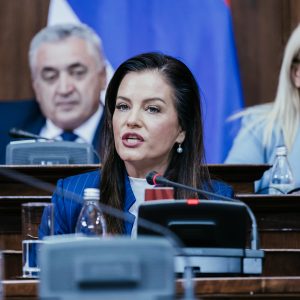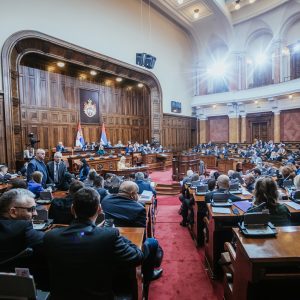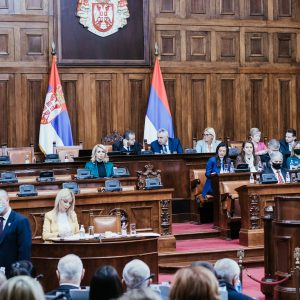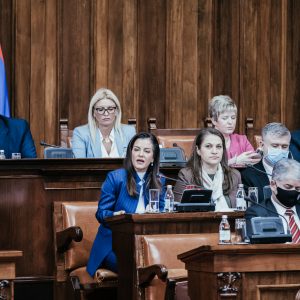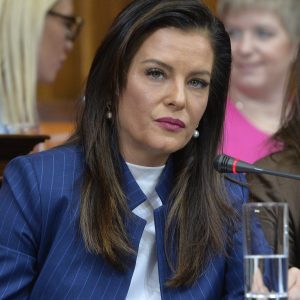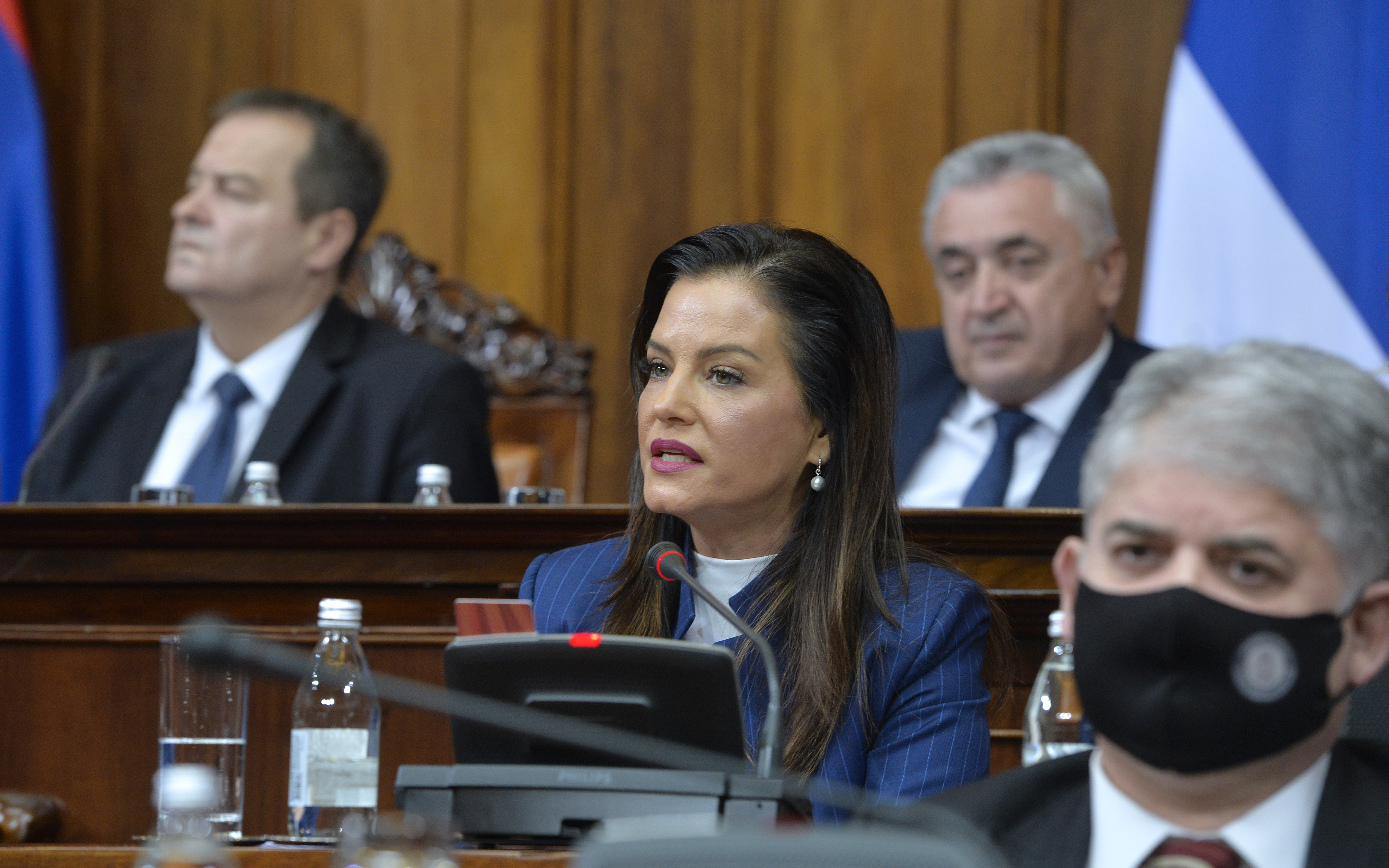
“The proposals for amendments to the election laws, namely the Bills on Electing the President of the Republic of Serbia, on the Election of Members of the Parliament and on Local Elections, are the result of efforts to improve the conditions for conducting elections at the national and local levels,” the Minister of Public Administration and Local Self-Government, Marija Obradović, has pointed out today in the National Assembly at the beginning of the joint debate on several Bills, which are on the agenda of the 16th Extraordinary Session of the National Assembly.
She has stated that the solutions containing all the proposed laws were created, on one hand, as a result of parallel inter-party dialogues on election conditions, conducted during 2021 with the participation of representatives of the European Parliament, or without their participation, and, on the other hand, that they implement the recommendations of the Office for Democratic Institutions and Human Rights of the Organization for Security and Cooperation in Europe (ODIHR) contained in the reports of this Organization concerning the monitoring of election procedures in the Republic of Serbia.
Also, an equally important aspect which influenced their content was the conducted public hearing in which Civil Society Organizations dealing with electoral matters participated, as well as persons from local self-governments. A significant number of their objections and proposals has been integrated into the proposed laws, Obradović has said.
The proposals for amendments to election laws aim to establish a higher degree of democracy and transparency of the election process, especially bearing in mind that the Bill on Electing the President of the Republic of Serbia and the Bill on Local Elections are harmonized with the new solutions in the Bill on the Election of Members of the Parliament, which was proposed at the same time, Obradović has said.
She added that the draft laws do not change the essential aspects of elections of Members of the Parliament, elections for the President of the Republic of Serbia and councillors of Local Self-government Units, and that they retain the current legal solutions which can be considered to be basic postulates of the election process in the Republic of Serbia.
The novelties introduced by these three election laws are important primarily in terms of protection of rights in election procedures and for easier candidacy of political parties of national minorities, as well as in terms of organization and transparency of the work of election administration bodies.
“The position of potential submitters of electoral lists is even facilitated, because according to the Bill on the Election of the Members of the Parliament, significantly less documentation needs to be submitted in order to announce the electoral list, while the position of minority electoral lists has been particularly facilitated, the proclamation of which will now require 5,000 voter statements, instead of the previous 10,000. When it comes to the organization and transparency of the work of election administration bodies, the Bill transferred certain solutions that have so far been part of the instructions adopted by the Republic Electoral Commission in order to conduct election processes, which have proven to be examples of good practice and which should become legal standards,” Obradović has stressed.
Speaking about the Bill on Electing the President of the Republic of Serbia, she has emphasized that the Bill itself does not introduce any substantial novelties to this election procedure, but mostly adapts the existing provisions in terms of terminology and logic to the solutions from the Bill on the Election of the Members of the Parliament. Thus, the President of the Republic of Serbia will still be able to be proposed by political parties and coalitions of parties, as well as by groups of at least ten citizens, while the existing deadline for submitting electoral lists, i.e. by no later than 20 days before election day, is retained.
When it comes to the novelties introduced by the Bill on Local Elections, Minister Obradović has stated that they are, inter alia, establishing the range of members of the electoral commission depending on the number of inhabitants of the Local Self-government Unit, as well as the deadline when the earliest decision can be made on announcing elections in relation to the expiration of the mandate of the councillors of the current convocation of the assembly of the Local Self-government Unit, which is 120 days at the earliest and 45 days before the expiration of the mandate. Also, an important novelty is the determining of the minimum required number of voters who support the electoral list with their signatures, which ranges from 200 to 3,000 for Local Self-government Units with over 500,000 registered voters. Another novelty is that new deadlines are set for constituting the Assembly, in order to avoid the possibility of obstruction, so that a deadline of 10 days is now prescribed, instead of the previous 15 days, for convening the constitutive session, as well as the obligation to hold it within 30 days from the day of publishing the decision on granting the mandates. In the circumstances when local and republic elections are held at the same time, special rules have been determined, and it is important that they are conducted by permanent polling boards formed in accordance with the Law on the Election of Members of the Parliament, Obradović has concluded.
As the authorized representative of the proposer, the Minister of Public Administration and Local Self-Government had also explained to the MPs the Bill on Financing Political Activities, which is the result of cooperation between state bodies and the OSCE/ODIHR and the Organization’s recommendations, as well as the obligation from Action Plan for Chapter 23.
The provisions of this Bill clearly define and differentiate the obligations of the Anti-Corruption Agency and the State Audit Institution, as well as of other bodies in the process of controlling political activities and political entities, but also determine the obligations and mechanisms for transparent financing of political entities. The novelties introduced by the Bill relate to the manner of borrowing by political entities, maximum amounts of loans and credits, maximum value of contributions which natural persons and legal entities can give to political entities for their regular work at the annual level, ban on financing political entities, election campaign costs such as advertising and any other type of advertising material used in the election campaign, more transparent monitoring of election campaign expenses by the Anti-Corruption Agency, which are now submitted during the election campaign, as well as the final report on the costs of the election campaign that political entities are obliged to submit to the Agency. Moreover, according to the provisions of this Bill, political parties are obliged to alienate shares and stakes acquired before the entry into force of this law.
Having in mind that the cognate debate in principle also includes the Bill on Wages of Civil Servants and State Employees, which falls within the scope of work of the Ministry of Public Administration and Local Self-Government, Minister Obradović has pointed out that the said Bill proposes a change in the coefficient for calculating and payment of wages of employees who perform accompanying auxiliary technical work in state bodies.
“The amendment to this law stems from the need to compare the evaluation of auxiliary technical work in state bodies as much as possible with the values of comparable work performed by civil servants. This implies the realization of equal wages for the same work or work of the same value, bearing in mind that the basis for calculating the wages of employees in state administration bodies grew at a slower rate than the growth of the minimum wage,” Obradović has pointed out.
She has added that the Bill was drafted after extensive consultations with social partners – representative unions of employees in state bodies, by which their initiative to increase the coefficient for calculation of wages of employees was accepted, given the importance of their work, especially in the judiciary, which shall contribute to unhindered work and functioning of courts and Prosecutor’s offices in the Republic of Serbia.
“The change in the amount of the coefficient ranges from 1.20 for the jobs of employees of the sixth type – primary school, to 1.96 for the jobs of employees of the third type – college and undergraduate studies. This will increase the wages of over 4,500 employees from the third to the sixth pay grade group, which will create conditions for adequate differentiation in the evaluation of jobs of varying complexity, improve their financial position and contribute to employee motivation and quality of work,” Obradović has concluded.
The Minister of Public Administration and Local Self-Government, as the authorized representative of the proposer, had also provided explanations on the following Bills: Bill on Amendments to the Law on Prevention of Corruption, Bill on Amendments to the Law on Extra-Judicial Proceedings, Bill on Amendments to the Law on Items of General Use and on the provision of guarantees of the Republic of Serbia in favour of Banca Intesa a.d. Belgrade, Raiffeisen banka a.d. Belgrade, Komercijalna banka a.d. Belgrade, Sberbank Srbija a.d. Belgrade, OTP banka Srbija Joint Stock Company Novi Sad and Nova Ljubljanska banka d.d. Ljubljana, on behalf of the Public Enterprise “Srbijagas” Novi Sad.
Minister Obradović has called on the MPs to adopt the proposed laws on the Voting Day.
Photo and video gallery
Izlaganje ministarke MDULS na sednici NSRS o izmenama seta izbornih zakona – prvi deo
Izlaganje ministarke MDULS na sednici NSRS o izmenama seta izbornih zakona – drugi deo
Izlaganje ministarke MDULS na sednici NSRS o izmenama seta izbornih zakona – treći deo
Izlaganje ministarke MDULS na sednici NSRS o izmenama seta izbornih zakona – četvrti deo
Izlaganje ministarke MDULS na sednici NSRS o Predlogu zakona o platma državnih službenika i nameštenika
Video pokrivalica – izvor Tanjug




